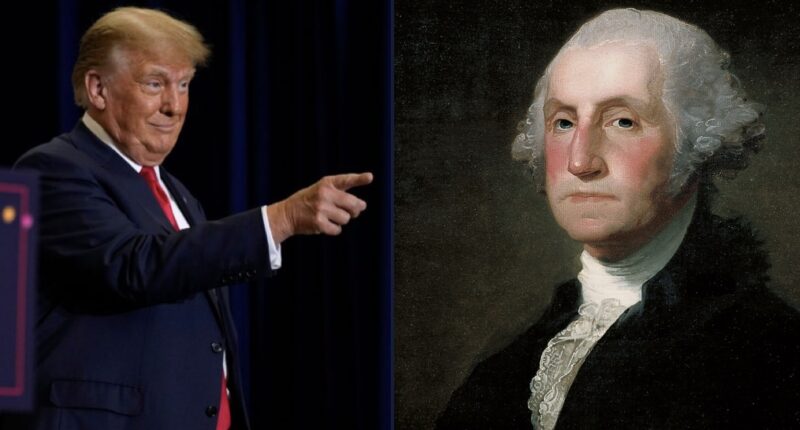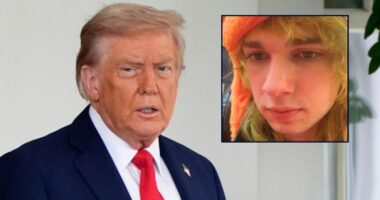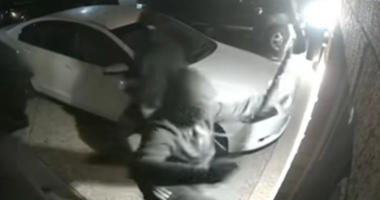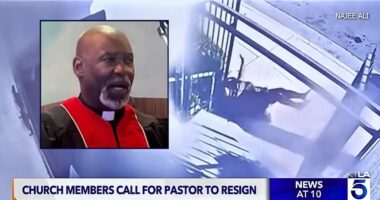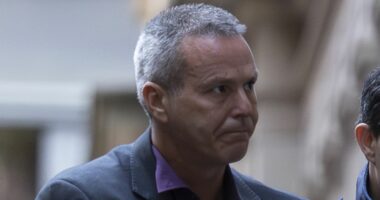Share this @internewscast.com
Left: Donald Trump (AP Photo/Charlie Neibergall). Right: Painting of George Washington (AP Photo/Corcoran Gallery of Art).
The Trump administration made a strong case for executive authority and criticized California Gov. Gavin Newsom in a court filing on Tuesday regarding the state’s efforts to halt President Donald Trump’s use of the U.S. military in response to immigration protests in Los Angeles.
In a 56-page appellant brief, the U.S. Department of Justice contended that the president acted within his rights by taking control of California’s National Guard in early June when a “violent mob” of protesters allegedly “pinned down federal personnel outside a federal building.”
The filing aims to depict a severe scenario of unchecked disorder in Los Angeles, with the alleged criminals’ anger directed towards federal immigration agents and federal property.
“The mob attacked the officers with concrete chunks, chairs, and other objects and used dumpsters as battering rams to breach the perimeter of the building,” the filing reads. “Large crowds assaulted a group of federal officers for seven hours, launching commercial-grade fireworks and rocks at the officers, trapping one officer in her vehicle while violently pummeling it with stones, shattering the wrist of another officer, and damaging federal buildings. The violence continued in the days that followed: More officers were injured, and federal buildings were seriously damaged.”
The underlying lawsuit in the case was filed days after the 45th and 47th president mobilized the military — first just the National Guard, and later a small group of Marines. Trump assumed control of reserve forces in response to multiple incidents of property destruction as waves of Angelenos sparred with law enforcement amid protests against Immigration and Customs Enforcement (ICE) actions throughout the city and county of Los Angeles.
Since then, the case has taken some dramatic turns.
A district judge sitting in San Francisco ruled in Newsom’s favor, finding Trump’s use of federal troops both “illegal” and a violation of the 10th Amendment.
The lower court’s ruling, however, was quickly paused and then stayed by the a panel of judges on the 9th Circuit – who found it “likely” that Trump “lawfully” deployed troops to “protect federal personnel performing federal functions and to protect federal property” amid civil unrest or, as the administration put it, “rebellion” over ICE raids.
Then, an unknown judge on the appellate court asked the parties to respond to a request for a poll – the procedure by which the full court might rehear the case decided by the panel. In response, the Trump administration argued there was no need.
Now, after those procedural hiccups, the U.S. Department of Justice is reiterating their long-held positions – in a direct appeal of the district court’s orders on the merits.
The government’s argument is fairly straightforward: Trump legally used federal troops to quell protesters’ violence.
“That order was consistent with the President’s statutory authority under 10 U.S.C. § 12406 and with the Tenth Amendment,” the brief argues. “And where, as here, federal agents experienced serious violence while seeking to do their jobs, the equities strongly favor the federal government. The district court’s order should be vacated.”
To hear the DOJ tell it, the relevant federal law – § 12406 – authorizes the president to call up National Guard members “in such numbers as he considers necessary” whenever “there is a rebellion or danger of a rebellion against the authority of the Government of the United States” or “the President is unable with the regular forces to execute the laws of the United States.”
In service of the argument that such a call-up was necessary to see the laws executed, the DOJ juxtaposed a purported “climate of violent anarchy” with ICE having to make repeat calls to the LAPD and response times of 55 minutes on at least one occasion.
“Federal officials need not be completely incapable of performing their jobs to satisfy the statute,” the brief goes on. “It is sufficient that federal officials were targeted by frequent and prolonged violent attacks specifically aimed at obstructing their enforcement of federal laws.”
The Trump administration’s filing also directly challenged some of the arguments advanced by U.S. District Judge Charles Breyer in his temporary restraining order.
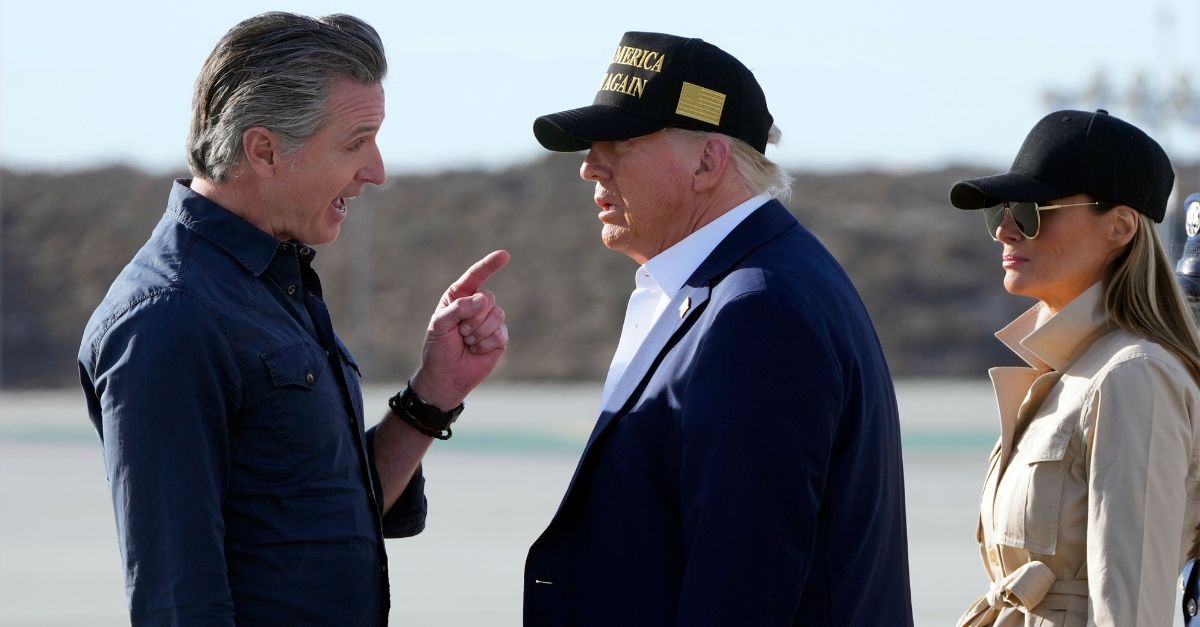
FILE – President Donald Trump and first lady Melania Trump listen to California Gov. Gavin Newsom after arriving on Air Force One at Los Angeles International Airport in Los Angeles, Jan. 24, 2025. (AP Photo/Mark Schiefelbein, File).
The lower court held that the statute’s language about “rebellion” was not satisfied because the protesters were not attempting to overthrow the government. This, the federal government argued, is not the correct reading. In a typical analytical exercise, the DOJ says the common – and legal – definitions of the word vindicate their position, including dictionaries used by Breyer himself in his order.
From the brief, at length:
The term “rebellion” encompasses the violent resistance to lawful enforcement of federal immigration law occurring in Los Angeles. Black’s Law Dictionary defines rebellion to include “[o]pen resistance or opposition to an authority or tradition” and”[d]isobedience of a legal command or summons.” The same understanding prevailed in 1903, when Congress first enacted what is now Section 12406. Dictionaries from the 1890 and 1900s define “rebellion” to focus on deliberate resistance to the government’s laws and authority.
The lower court, for its part, specifically said that “rebellion” refers to open, armed and organized resistance to “the government as a whole” as opposed to fighting for or against “a single law or issue.”
The Trump administration’s brief goes on to cite a direct historical contradiction – the Whiskey Rebellion of 1791-1794.
“Most famously, President Washington called up the militia to assist in suppressing the Whiskey Rebellion-a violent protest in western Pennsylvania targeted at tax assessors attempting to collect a federal excise tax on distilled whiskey,” the brief continues. “President Washington took that action under a 1792 statute that did not by its terms refer to ‘rebellion.’ But when Congress later enacted statutes referring to a “rebellion,” those statutes plainly extended to cover this original historical precedent of violent opposition limited to a particular federal law–precisely what occurred in Los Angeles.”
The federal government’s filing also aims to dispatch with a procedural requirement of the relevant statute – or, rather, Newsom’s understanding of that requirement.
The lower court’s order took the Trump administration to task for purportedly violating the prong requiring the National Guard to be called up “through the governors of the States.”
To hear Breyer tell it, this section was circumvented because the call-up order was never sent to Newsom before it was issued. In doing so, the lower court largely sidestepped the issue of what “through” actually means in the context of the law. But, in Newsom’s estimation, it means something not entirely unlike consultation or consent.
The Trump administration short-circuits all of these arguments by arguing the order did satisfy the statute – because it was sent to the National Guard’s senior officer in California.
“The President’s order was transmitted to the California Adjutant General, the commander of state military forces, who then shared the order with the Governor and transferred authority over the Guard members to the federal commander,” the brief argues.
On most of the issues, the DOJ cites the 9th Circuit’s panel opinion in its favor – but takes one notable opportunity to disagree.
That disagreement is over judicial review and executive authority.
“The stay panel erred, however, in concluding that [a U.S. Supreme Court case] and its progeny preserve some degree of judicial review–albeit highly deferential–of the President’s decision to call forth the Guard,” the brief goes on. “[T]he President is vested with the discretion to determine whether an exigency requiring military aid has arisen and ‘his decision is conclusive upon all other persons. ‘”
